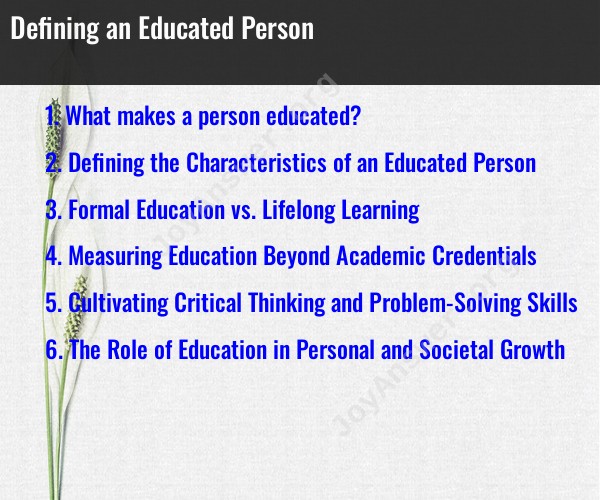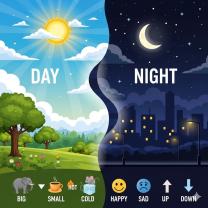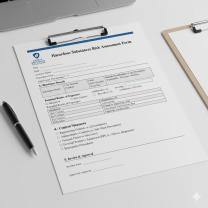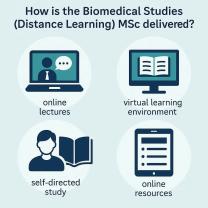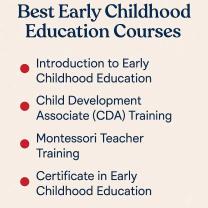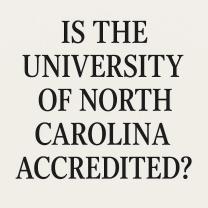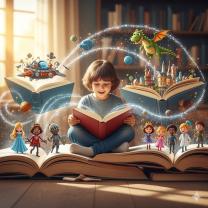What makes a person educated?
Defining an educated person is a complex and multifaceted task because education can take on different forms and meanings depending on the context and individual perspectives. However, there are some common characteristics and qualities that are often associated with an educated person:
Knowledge and Skills: An educated person possesses a well-rounded and substantial body of knowledge in various fields, such as the arts, sciences, humanities, and practical skills. This knowledge can be acquired through formal education, self-directed learning, and life experiences.
Critical Thinking: Education fosters critical thinking skills, enabling individuals to analyze information, evaluate arguments, and make informed decisions. An educated person can approach problems and challenges with a critical and analytical mindset.
Communication Skills: Effective communication is a hallmark of an educated person. This includes the ability to express ideas clearly, listen attentively, and engage in meaningful and respectful dialogue with others.
Open-Mindedness: Education encourages an open-minded and curious approach to the world. An educated person is receptive to new ideas, different perspectives, and diverse cultures, and is willing to adapt and evolve their beliefs and understanding as they learn.
Ethical and Moral Awareness: Education often includes the development of ethical and moral principles. An educated person is expected to have a sense of right and wrong and to make ethical decisions in both personal and professional contexts.
Problem-Solving and Adaptability: An educated person is capable of identifying and solving problems, whether they are practical, intellectual, or social in nature. They are also adaptable and can navigate change and uncertainty effectively.
Empathy and Social Awareness: Education often promotes empathy and a sense of social responsibility. An educated person is aware of societal issues, is compassionate towards others, and actively seeks ways to contribute to the betterment of their community and the world.
Lifelong Learning: Education is not confined to a specific period or institution. An educated person recognizes the importance of lifelong learning and continues to acquire knowledge, skills, and insights throughout their life.
Cultural Literacy: Cultural awareness and an appreciation for the arts, literature, history, and diverse cultures are important aspects of being educated. This includes an understanding of one's own culture and the ability to appreciate and respect the cultures of others.
Civic Engagement: An educated person often takes an active role in their community and society, participating in civic activities, and contributing to the democratic process.
It's important to note that being educated is an ongoing and evolving process, and there is no fixed endpoint to education. Different cultures, societies, and individuals may have varying expectations and definitions of what it means to be educated. Additionally, education is not solely limited to formal schooling; informal and experiential learning also play a crucial role in shaping an educated individual.
Defining the Characteristics of an Educated Person
An educated person is someone who has developed their knowledge, skills, and abilities through formal education and lifelong learning. They are able to think critically, solve problems, and communicate effectively. They are also knowledgeable about the world around them and have a deep understanding of their own values and beliefs.
Formal Education vs. Lifelong Learning
Formal education is the process of acquiring knowledge and skills through structured instruction, such as in schools and universities. Lifelong learning is the process of continuing to learn and grow throughout one's life. It can be done through formal education, but it can also be done through informal experiences, such as reading, attending workshops, and traveling.
Measuring Education Beyond Academic Credentials
Academic credentials, such as diplomas and degrees, can be used to measure education, but they are not the only measure of education. Other important measures of education include:
- Critical thinking and problem-solving skills
- Communication skills
- Knowledge of the world around you
- Understanding of your own values and beliefs
- Ability to adapt to change
- Ability to work effectively with others
Cultivating Critical Thinking and Problem-Solving Skills
Critical thinking and problem-solving skills are essential for success in today's world. They allow you to:
- Analyze information and identify problems
- Develop solutions to problems
- Make informed decisions
Critical thinking and problem-solving skills can be cultivated through education and experience. Here are some tips for cultivating critical thinking and problem-solving skills:
- Ask questions and challenge assumptions.
- Consider multiple perspectives.
- Be open to new ideas.
- Evaluate evidence carefully.
- Draw logical conclusions.
- Experiment and try different solutions.
The Role of Education in Personal and Societal Growth
Education plays an important role in both personal and societal growth. On a personal level, education can help you to:
- Develop your knowledge, skills, and abilities
- Reach your full potential
- Live a fulfilling life
On a societal level, education can help to:
- Create a more informed and engaged citizenry
- Promote economic growth
- Reduce poverty and inequality
- Create a more just and equitable society
Education is essential for both personal and societal growth. It is a powerful tool that can help us to build a better future for ourselves and for the world around us.
